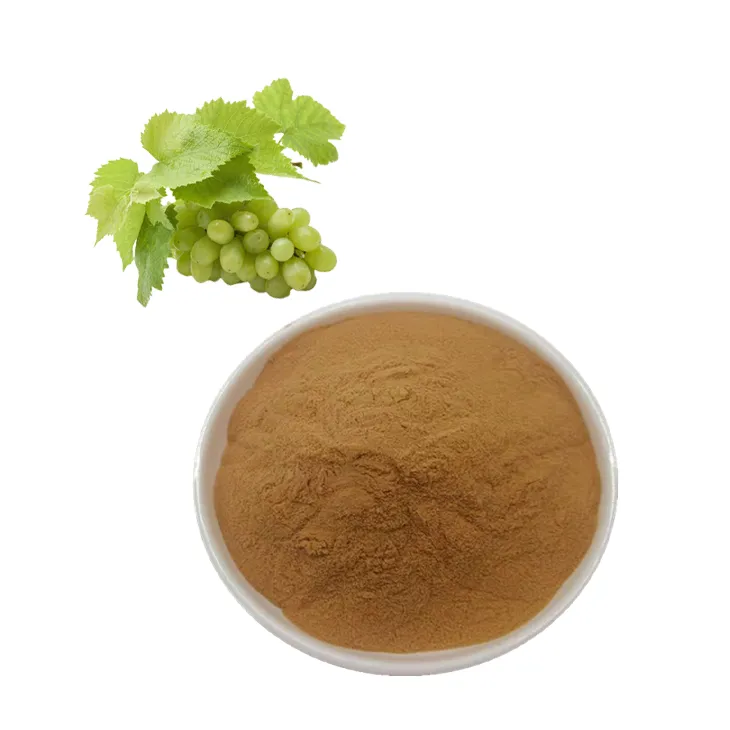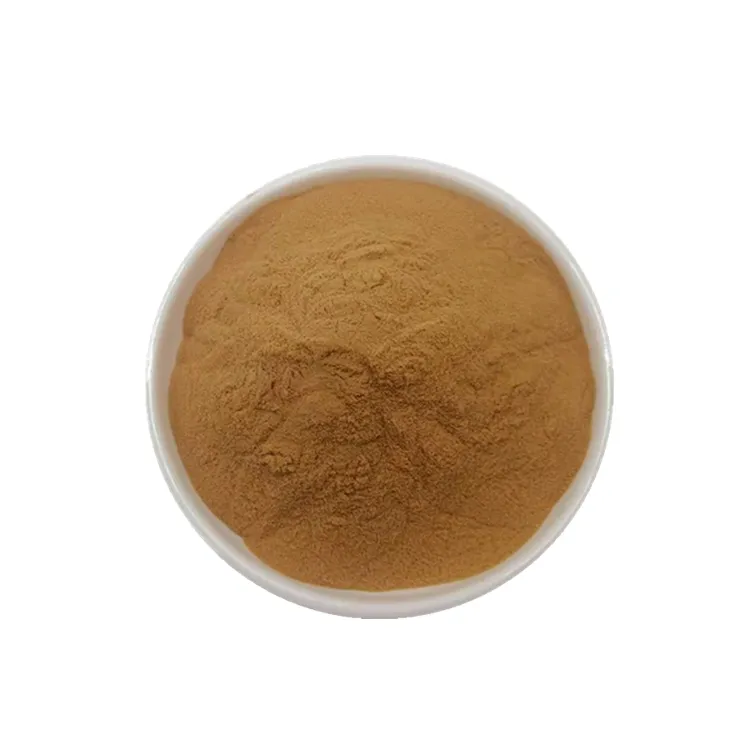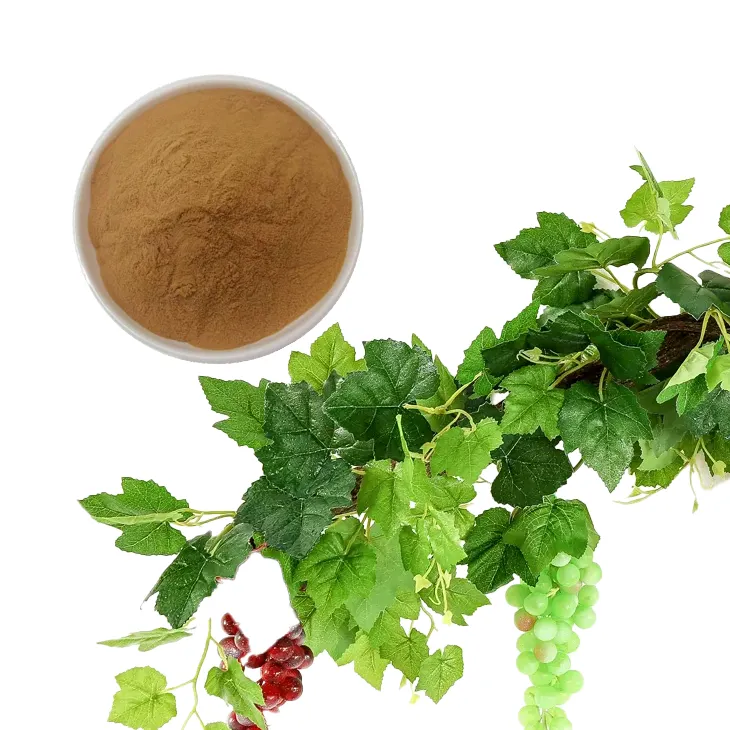- 0086-571-85302990
- sales@greenskybio.com
Grape Leaf Extract: What Are the Benefits and How to Take It?
2024-11-13

1. Introduction
In recent times, Grape Leaf Extract has become a topic of significant interest due to its numerous potential health - promoting properties. This extract is derived from the leaves of grapevines, which are well - known for their use in winemaking. However, the leaves themselves contain a wealth of bioactive compounds that are now being explored for their impact on human health.

2. Bioactive Compounds in Grape Leaf Extract
Grape Leaf Extract is rich in a variety of bioactive compounds, each contributing to its potential health benefits.
2.1 Polyphenols
One of the main groups of compounds found in grape leaf extract are polyphenols. These are antioxidants that play a crucial role in protecting the body from oxidative stress. Oxidative stress is associated with the development of various chronic diseases, such as heart disease, cancer, and neurodegenerative disorders. By neutralizing free radicals, polyphenols in grape leaf extract can help maintain the integrity of cells and tissues.
2.2 Flavonoids
Flavonoids are a subset of polyphenols that are particularly abundant in grape leaf extract. They have been shown to have anti - inflammatory properties. Inflammation is a natural response of the body to injury or infection, but chronic inflammation can lead to tissue damage and disease. Flavonoids can help regulate the body's inflammatory response, reducing the risk of conditions like arthritis and inflammatory bowel disease.

3. Potential Health Benefits
The presence of these bioactive compounds gives grape leaf extract a range of potential health benefits.
3.1 Immune System Enhancement
As mentioned earlier, grape leaf extract has been studied for its ability to enhance the immune system. A strong immune system is essential for the body to defend itself against infections, such as bacterial, viral, and fungal infections. The bioactive compounds in the extract can stimulate the production of immune cells, such as white blood cells, and improve their function. This can help the body more effectively recognize and eliminate pathogens.
3.2 Cognitive Function Improvement
Another potential benefit is the improvement of cognitive function. Grape leaf extract may contribute to better cognitive function through its effect on blood circulation. By improving blood flow to the brain, it ensures that the brain receives an adequate supply of oxygen and nutrients. This can enhance memory, concentration, and overall mental performance. It may also have a protective effect against neurodegenerative diseases like Alzheimer's and Parkinson's, although more research is needed in this area.
3.3 Cardiovascular Health
The polyphenols and flavonoids in grape leaf extract can also have a positive impact on cardiovascular health. They can help lower blood pressure by relaxing the blood vessels, reducing the workload on the heart. Additionally, these compounds can improve lipid profiles by reducing levels of LDL (bad) cholesterol and increasing levels of HDL (good) cholesterol. This helps to prevent the formation of atherosclerotic plaques in the arteries, reducing the risk of heart attacks and strokes.
3.4 Anti - Aging Effects
Due to its antioxidant properties, grape leaf extract can help slow down the aging process. Free radicals are constantly produced in the body as a result of normal metabolic processes, and they can damage cells and DNA over time. By scavenging these free radicals, the extract can help maintain the youthful function and appearance of the skin, hair, and other tissues. It may also help prevent age - related diseases and improve overall longevity.

4. Forms of Grape Leaf Extract
Grape leaf extract is available in different forms, each with its own advantages.
4.1 Liquid Extracts
Liquid extracts are a popular form of grape leaf extract. They are convenient because they can be easily measured using a dropper or a measuring spoon. This allows for precise dosing, which is important when taking supplements. Liquid extracts can be added directly to drinks, such as water, juice, or tea, making them easy to consume. They are also quickly absorbed by the body, which means that their beneficial compounds can start working relatively fast.
4.2 Chewable Tablets
Chewable tablets are another option for taking grape leaf extract. These are more palatable for some people, especially those who do not like the taste of liquid extracts or have difficulty swallowing pills. Chewable tablets often come in flavored varieties, which can make the supplement - taking experience more enjoyable. They are also easy to carry around, making them a convenient option for people on the go.
4.3 Capsules
Capsules are a common form of dietary supplements, and grape leaf extract is also available in this form. Capsules are easy to swallow and can protect the extract from degradation in the stomach before it reaches the intestines, where it is absorbed. They are a good option for those who prefer a more traditional form of supplement and do not want to taste the extract.
5. How to Take Grape Leaf Extract
When it comes to taking grape leaf extract, there are several important considerations.
5.1 Dosage
The appropriate dosage of grape leaf extract can vary depending on several factors, such as the individual's age, health status, and the specific health goal. In general, it is recommended to start with a low dose and gradually increase it if necessary. However, it is crucial to follow the instructions provided by the manufacturer or consult a healthcare professional for personalized dosage advice.
5.2 Frequency
The frequency of taking grape leaf extract also depends on the form of the extract and the individual's needs. For liquid extracts, it may be taken once or twice a day, while chewable tablets and capsules may be taken according to the recommended schedule on the product label. It is important to be consistent with the dosing frequency to achieve the best results.
5.3 Timing
The timing of taking grape leaf extract can also play a role in its effectiveness. Some people prefer to take it in the morning to start their day with its potential health benefits, while others may take it in the evening. However, if the extract has a stimulatory effect on the body, it may be better to avoid taking it close to bedtime to prevent interference with sleep.
6. Precautions and Considerations
Before starting to take grape leaf extract, there are some important precautions to keep in mind.
6.1 Consult a Doctor
It is essential to consult a doctor before starting any new supplement, including grape leaf extract. A healthcare professional can assess your individual health situation, including any existing medical conditions, medications you are taking, and potential drug - supplement interactions. They can also provide guidance on the appropriate dosage and form of the extract for you.
6.2 Allergies
Some people may be allergic to grapes or related products. If you have a known allergy to grapes, it is likely that you should avoid grape leaf extract as well. Allergic reactions can range from mild symptoms, such as skin rashes and itching, to more severe reactions, such as difficulty breathing and anaphylactic shock.
6.3 Pregnancy and Breastfeeding
There is limited research on the safety of grape leaf extract during pregnancy and breastfeeding. As a precaution, it is advisable for pregnant and breastfeeding women to avoid taking grape leaf extract unless specifically recommended by a healthcare provider.
7. Conclusion
Grape leaf extract shows great promise as a natural supplement with a variety of potential health benefits. Its rich content of bioactive compounds, such as polyphenols and flavonoids, can contribute to immune system enhancement, cognitive function improvement, cardiovascular health, and anti - aging effects. However, when considering taking grape leaf extract, it is important to choose the right form, follow the appropriate dosage and frequency, and take necessary precautions, especially consulting a doctor before starting. With proper use, grape leaf extract may be a valuable addition to a healthy lifestyle.
FAQ:
What are the bioactive compounds in grape leaf extract?
Grape leaf extract contains various bioactive compounds, but specific ones may include polyphenols, flavonoids, and other phytochemicals. These compounds are believed to be responsible for many of its potential health - promoting effects, such as antioxidant and anti - inflammatory properties.
How exactly does grape leaf extract enhance the immune system?
The exact mechanism by which grape leaf extract enhances the immune system is still under study. However, it may be related to its antioxidant properties that help protect immune cells from damage, or it could potentially modulate certain immune signaling pathways. Some studies suggest that its bioactive compounds may stimulate the production of immune - related cells or enhance their function.
Can grape leaf extract really improve cognitive function?
There is evidence suggesting that grape leaf extract may contribute to better cognitive function. By improving blood circulation to the brain, it can potentially ensure that the brain receives an adequate supply of oxygen and nutrients. This in turn may support the normal functioning of neurons and cognitive processes. However, more research is needed to fully understand the extent and mechanisms of this effect.
Is there a recommended dosage for taking grape leaf extract?
As of now, there is no one - size - fits - fits - all recommended dosage for grape leaf extract. The appropriate dosage can vary depending on factors such as an individual's age, health condition, and the specific form of the extract. It is crucial to consult a doctor before starting to take grape leaf extract to determine the most suitable dosage for you.
Are there any side effects of taking grape leaf extract?
While grape leaf extract is generally considered safe for most people when taken as directed, some individuals may experience side effects. These could potentially include mild digestive issues such as nausea or stomach upset. However, if you have any underlying health conditions or are taking other medications, it is especially important to consult a doctor as there may be potential interactions.
Related literature
- The Health Benefits of Grape Leaf Extract: A Comprehensive Review"
- "Grape Leaf Extract and Immune System Modulation: Current Research"
- "Cognitive Effects of Grape Leaf - Derived Compounds: A Scientific Perspective"
- ▶ Hesperidin
- ▶ Citrus Bioflavonoids
- ▶ Plant Extract
- ▶ lycopene
- ▶ Diosmin
- ▶ Grape seed extract
- ▶ Sea buckthorn Juice Powder
- ▶ Fruit Juice Powder
- ▶ Hops Extract
- ▶ Artichoke Extract
- ▶ Mushroom extract
- ▶ Astaxanthin
- ▶ Green Tea Extract
- ▶ Curcumin
- ▶ Horse Chestnut Extract
- ▶ Other Product
- ▶ Boswellia Serrata Extract
- ▶ Resveratrol
- ▶ Marigold Extract
- ▶ Grape Leaf Extract
- ▶ New Product
- ▶ Aminolevulinic acid
- ▶ Cranberry Extract
- ▶ Red Yeast Rice
- ▶ Red Wine Extract
-
Mulberry Extract
2024-11-13
-
Fenugreek Extract Powder
2024-11-13
-
Peppermint Oil
2024-11-13
-
Hops Extract
2024-11-13
-
Angelica sinensis extract
2024-11-13
-
Almond Extract Powder
2024-11-13
-
Grape Leaf Extract
2024-11-13
-
Aminolevulinic acid
2024-11-13
-
Oat Straw Extract Powder
2024-11-13
-
White Peony Extract
2024-11-13




















